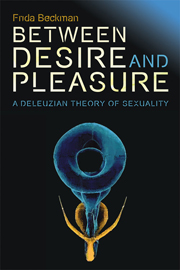Book contents
- Frontmatter
- Contents
- Preface
- Introduction: The Body without Orgasm
- 1 A Nonlinear History of Sexuality: Deleuze with Foucault
- 2 Psychoanalysis Unhinged: Deleuze with Lacan, Klein and Reich
- 3 Folding, Individuation and the Pleasurable Body
- 4 Orgasmic Feminism
- 5 Disabling Sex: Inventing a People who are Missing
- 6 Becoming-Animal and the Posthuman Orgasm
- 7 Capitalism and Sexuality
- Epilogue: Swedish Sin, or the Importance of Remaining Curious
- Bibliography
- Index
2 - Psychoanalysis Unhinged: Deleuze with Lacan, Klein and Reich
Published online by Cambridge University Press: 05 October 2013
- Frontmatter
- Contents
- Preface
- Introduction: The Body without Orgasm
- 1 A Nonlinear History of Sexuality: Deleuze with Foucault
- 2 Psychoanalysis Unhinged: Deleuze with Lacan, Klein and Reich
- 3 Folding, Individuation and the Pleasurable Body
- 4 Orgasmic Feminism
- 5 Disabling Sex: Inventing a People who are Missing
- 6 Becoming-Animal and the Posthuman Orgasm
- 7 Capitalism and Sexuality
- Epilogue: Swedish Sin, or the Importance of Remaining Curious
- Bibliography
- Index
Summary
But how very strange this domain seems, simply because of its multiplicity – a multiplicity so complex that we can scarcely speak of one chain or even of one code of desire.
(Deleuze and Guattari 1983: 38)Introduction
That Deleuze and Guattari disapprove of Freud's conception of desire has been well noted. Their vehement rejection of the regulation of desire through Oedipal structures and the triangle of daddy-mummy-me in many ways serves as the very starting point of their Capitalism and Schizophrenia project. On the topic of the orgasm, Freud's theories, which we will have occasion to return to repeatedly through this book, not least in Chapter 3, are largely preoccupied with keeping sexual pleasure under control and within the limits of ‘normal’ sexual exchange. Thus, for example, he argues that once girls hit puberty, clitoral orgasm should be discouraged in favour of the vaginal alternative since the recurrence of the former could result in frigidity. Since Deleuze and Guattari's rejection of Freudian theories are so unequivocal, and because so many studies have further clarified this relation, the present chapter will focus on the psychoanalytic theories that remain an important influence on Deleuze. In a note for the Italian edition of The Logic of Sense, Deleuze writes that what happened to him since he wrote this book is that he met Guattari.
- Type
- Chapter
- Information
- Between Desire and PleasureA Deleuzian Theory of Sexuality, pp. 30 - 44Publisher: Edinburgh University PressPrint publication year: 2013



